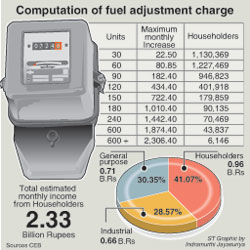| The electricity price increase is also adding to the soaring cost of living.
A cross section of the public commented on the increase.
Small and medium enterprises are also in the clutches of price increases which minimises their profit margin.
"The government should plan to face such a situation where there is a sudden increase in fuel prices. Then the government should cut down on unnecessary costs," says Mrs. Dharshani Thamara, a working mother who resides in Thalawathugoda.
"Laying the burden on the customers is an unwise solution. Our revenue is stagnant while costs rise sky high. How are we to cope with this sort of cost escalation", she added.
A labourer residing in Pannipitiya, J.T. Jayasundara commenting said, "The prices of all the goods and services have gone up and now the electricity charges are added to that. I am a daily-paid worker, and it is barely enough to feed my family, let alone pay additional charges".
A Senior Marketing Manager, Uvindhu Gopallawa said, "In the short term, we will have to revise prices to curb losses. In the medium term, we will re-strategize and re- arrange processes to create synergies, in order to increase productivity over the increase in costs. From now, we hope the respective authorities will be more prudent and transparent in managing the economy."
Manager of a private company, Viraj Jayasinghe said that, with regard to the increase in electricity tariffs, a cost increase is expected, hence the company is compelled to increase the prices of the services it provides.
Last week, the Public Utilities Commission of Sri Lanka (PUCSL) announced that with effect from February 16, an additional Fuel Adjustment Charge (FAC) will be added to the electricity tariff.
According to the PUCSL, the FAC is a "temporary" measure to cover up the additional cost of Rs 29 billion incurred by the CEB for electricity generation due to the fuel price hike.
The PUCSL states that Rs 25 billion out of Rs. 29 billion will be earned through FAC, while the balance Rs. 4 billion will be recovered through government subsidies.
The FAC on domestic commuters who consume 0-30 units of electricity will be 15%, 31-60 units will be 35% and 61 units and upwards will be 40%. A FAC of 15% will be charged from factories and hotels, whereas a 25% FAC will be charged on general purpose consumers. However, this charge is not applicable to Street Lamps, Religious Institutions and Government schools and hospitals. |


